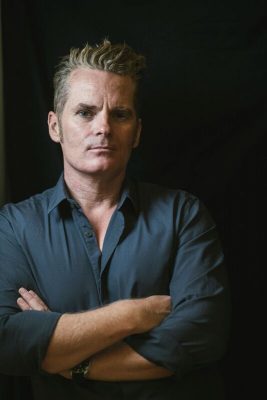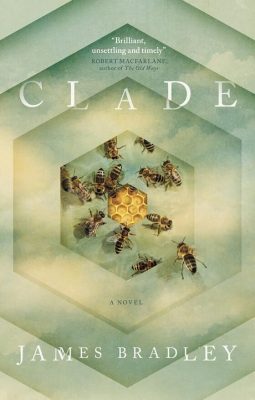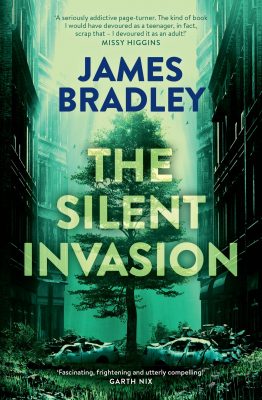
I’m happy to welcome James Bradley, Australian novelist and critic. James Bradley is an Australian novelist and critic. His books include the novels Wrack, The Deep Field , The Resurrectionistand Clade, a book of poetry, Paper Nautilus, and The Penguin Book of the Ocean, as well as The Change Trilogy for young adults, the first two books of which, The Silent Invasion and The Buried Ark, are published by Pan Macmillan Australia. He is currently in the process of finishing the final book of The Change Trilogy and working on a new adult novel, which will be published in 2020 by Hamish Hamilton.
James has written for numerous Australian and international publications, including The Times Literary Supplement, The Guardian, The Washington Post, The Australian Literary Review, Australian Book Review, The Monthly, Locus, The New York Review of Science Fiction, Griffith Review, Meanjin, Heat, The Weekend Australian, The Sydney Morning Herald and The Age. In 2012 he was awarded the Pascall Prize for Criticism.
James has written for numerous Australian and international publications, including The Times Literary Supplement, The Guardian, The Washington Post, The Australian Literary Review, Australian Book Review, The Monthly, Locus, The New York Review of Science Fiction, Griffith Review, Meanjin, Heat, The Weekend Australian, The Sydney Morning Herald and The Age. In 2012 he was awarded the Pascall Prize for Criticism.
James lives in Sydney, Australia, with his partner, the novelist Mardi McConnochie, and his daughters, Annabelle and Lila. If you’d like to know more about the author, this interview in the Sydney Review of Books isn’t a bad place to begin. Also of note is a talk that James had with Iain McCalman, professor and co-director of the Sydney Environment Institute, covering “Storytelling in the Anthropocene.”
I’ll be talking with James about climate change in fiction, particularly his novels Clade–published by Titan in the UK and US on September 5, 2017–and The Silent Invasion. I’ve read some of James’ thoughts about this subject and found the author to be quite insightful, so I’m grateful to James for making time for this chat.
 Mary: Thanks for joining me. At dragonfly.eco I look at how various environmental issues are dealt with in storytelling, and researching this field is how I found your novel Clade and your newest YA trilogy The Silent Invasion. Having recently read Clade, I was quite moved by the multi-generational story of a family dealing with their personal relationships but also with the effects of climate change. What led you to build this story?
Mary: Thanks for joining me. At dragonfly.eco I look at how various environmental issues are dealt with in storytelling, and researching this field is how I found your novel Clade and your newest YA trilogy The Silent Invasion. Having recently read Clade, I was quite moved by the multi-generational story of a family dealing with their personal relationships but also with the effects of climate change. What led you to build this story?
James: The novel grew out of a few things, but one of the most important was a desire to think through the whole idea of climate change, what it might mean, and perhaps just as importantly, what it might be like to experience. Those were questions I’d been thinking about and writing about for a long time, but I’d never been able to find a way of getting at them in novel form, mostly because the whole subject seemed too big and too complex to pin down. So while I’d written short stories that approached the question tangentially or metaphorically, and I’d been working on a novel which was a sort of immense novel of everything, it all always seemed somehow too direct, too obvious.
And then one day it occurred to me that I could just turn the whole thing inside out, and instead of writing a novel about everything, I could write a novel that explored the question through the much more confined and particular experiences of a family. As soon as I did that I realised I’d found a structure that allowed me to do a whole lot of things the much bigger narrative couldn’t, perhaps the most important of which was to explore the affective dimension of climate change, which was useful because I felt like it gave me – and other readers – a prism through which to think about an issue which often seems too big to hold in our heads. But it also allowed me to talk about time, and deep time, both of which are recurrent themes in the novel, and which are an inescapable part of any discussion of climate change.
Mary: Clade eclipses time and grapples well with the hyperobject that is climate change. I noticed too that extinctions and “the past” were haunting and ghost-like, giving the constant feeling of nostalgia and loss throughout–but without being depressing, due to the characters experiencing continued wonder and hope despite the extinction surrounding them. You mentioned in The Guardian that “The writer Jeff VanderMeer has described climate change as a kind of haunting.” I’ve talked with Jeff some about this and found it really apt. Did you set out to write a “ghost story”–and how do you feel about the fact that we are so adaptable and curious despite such loss?
James: I think the idea of haunting is a really powerful one. One of the great ironies of contemporary Western culture is that many – if not most – of us exist in a state of constant denial about the human and environmental cost of our lifestyle. That sense of simultaneous awareness and willed ignorance emerges in different ways, but describing our sense that things are not right, that the weather is weird and wrong, that things are out of control as a sort of haunting is a good way of getting at how it feels, and has quite a lot to do with the thread of the apocalyptic and the disordered that runs through so much of contemporary culture. Robert Macfarlane argues something similar in his fantastic essay about the rise of the eerie in contemporary English fiction, but really, it’s everywhere.
So in that sense, I suppose Clade is a kind of ghost story, because it’s a book that’s quite consciously shadowed by a profound grief about what’s happening around us. In places that grief is expressed through the characters and their lives, and through the steady sense of diminution the characters live through, but it’s also addressed more explicitly, through a dialogue with the actual physical effects of climate change.
That’s partly deliberate, but it’s also inescapable, because you can’t write about climate change without writing about loss, whether of species or abundance or simply of possibility. That loss was very much on my mind when I wrote the book, because I have young children, and I’m acutely aware that the world they will live in will be a poorer – and probably less pleasant – world than I’ve known, a world without coral reefs, with less diversity, fewer birds, fewer animals, and probably more conflict and violence. As a parent that makes me terribly sad, but as a human being it makes me incredibly angry, because it’s really a form of theft – our generation and the generation before us have stolen them and the planet’s future.
But while the book is very much about those things, I also wanted it to do a couple of other things. As I’ve already said I wanted to give people an affective sense of what it might be like to live through the next century or so. But I also wanted to create space for people to think about the possibility of change. Frederic Jameson famously said that it’s easier to imagine the end of the world than to imagine the end of capitalism, a notion the late Mark Fisher picked up on when he described capitalism as filling every horizon and blotting out all alternatives. But once I started thinking seriously about time, and deep time in particular, I found myself reminded of the degree to which a consideration of both reminds us that the future isn’t set; it’s contingent, which means it can be changed. So, although the book doesn’t set out to offer alternatives, it quite deliberately makes the space for them, both by setting the events of the book against the immensity of geological time, so we’re reminded that our lives, our economy, our politics, are really little more than blips, and by emphasising the way history keeps happening, even after what appears to be the end.
Mary: In the futuristic world of Clade are simulated games where players can escape and even see the old world before its many extinctions. It made me think of something David Brin and other authors often write about–that this type of simulation may be available in the future, where our descendants would control us in these worlds. I thought your story might be going there! Did computer simulation theory enter your mind when writing Clade?
James: I’d love to pretend it had, but unfortunately it didn’t. Although that said, the whole question of the increasingly blurry line between the real and the virtual is one that’s threaded through Clade, not just in the scenes with Dylan and the sims and the games, but in the section in which Summer and her friends find the virtual porn and the scene in which Lijuan uses the augmented reality goggles to view the lost beauty of the forest. That’s partly because I think the increasingly mediated way we experience the world has more than a little to do with our larger alienation from the natural world, and indeed the world in general, the way nobody seems to think anything’s real unless we’ve taken a photo of it or videoed it. Likewise it’s difficult to avoid the fact our devices exist in large part to facilitate the consumption that’s driving our ever-expanding environmental footprint. But it’s also there because it seems to me there’s a sort of resonance between virtuality and the kind of grief we were talking about before: rather as Susan Sontag observed about photography and the death’s head that haunts every photo, the virtual is shadowed by the world we’re losing to create the technology that supports that virtuality.
Mary: It’s interesting that you bring this up, because already many gamers, especially those playing the old high-fantasy MMOs derivative of Tokien’s universe, get a chance to see worlds as they were before forests were logged or oceans were polluted.
One of the biggest paradoxes about climate change, to me, is that there is a spectrum of denialism surrounding it–on one end are people who don’t believe it’s happening and near the other end are people who know it is, but, as you inferred in Clade, as soon as we’re away from it, our old thinking reasserts itself, meaning, I think, that it’s easy to forget the reality in front of us in order to continue to find what we’re used to–the familiarity of convenience and comfort, which actually defy trying to mitigate climate change. Do you think fiction can help with this, and how so?
James: Hard-core denialism isn’t about fact or science in the first place–it’s about power and particular patterns of mostly male behaviour, so fiction isn’t going to change their minds because nothing will. But I also think there are a lot of other people who haven’t really come to grips with the reality of what’s going on, or who feel disempowered by the scale of the problem, and while I’m not sure fiction can necessarily change their minds, I think it can do important work by giving them tools with which to think about the problem. Sometimes that will be by helping them imagine what it’s going to be like, by connecting it to their own lives and experiences. Sometimes it will be by helping them see the problem from different perspectives (something I think Barbara Kingsolver’s book, Flight Behaviour does really well by reminding us of the degree to which class and wealth inform the problem), or by offering a vision of alternatives, in the way some of Kim Stanley Robinson’s novels do. None of them are going to change the world on their own, but I think that in combination they create a space where we can think about the problem and our own relationship to it, and make the idea of change more tangible.
Mary: I agree, and it seems that there is quite a diversity in storytelling when it comes to climate change–given that this category of literature goes back several decades. I like what you said in the Sydney Review of Books, February 2017, in the article “Writing on the Precipice”. In talking about nature writing, you said “Its once relatively homogenous forms and conventions [have been] discarded in favour of a new heterogeneity.” Maybe this statement was mostly about nonfiction, but I have found the same to be true for fiction–that there are so many approaches and genres that may describe novels that dip into the realm of climate change. What do you think in regards to how we label this literature, or not label it?
James: The same is definitely true of fiction. But anxiety about the climate and the environment is everywhere in contemporary culture, so that’s not surprising. Just personally I’m not keen on the idea climate fiction is a new genre, or a kind of sub-genre of science fiction. That’s partly because of the heterogeneity you mention and the fact so much of the work deliberately transcends traditional genre categories, as well as the fact describing it that way means we end up thinking about the whole phenomenon in such a literal way, when in fact the anxieties and experiences it explores intrude into so many things in more tangential and metaphorical ways. But it’s also because I think those experiences and anxieties are now so inescapable that it’s more accurate to think of them as a tangible condition, in the same way modernism was, and any work that genuinely seeks to engage with the contemporary world is necessarily shaped by our sense of environmental crisis, and the immense challenges it poses to us not just as writers and artists, but as a society.
Mary: For readers interested in more of James’ thoughts on the above, please see his article “The End of Nature and Post-Naturalism: Fiction and the Anthropocene.”
 The Silent Invasion is your newest project, the first book in your young adult (YA) trilogy titled Change. I read in the Guardian article mentioned above that having kids helped you to realize the importance of writing for teenagers and young adults. Can you tell us more about this trilogy as well as about how do we leave this world to our kids and grandkids?
The Silent Invasion is your newest project, the first book in your young adult (YA) trilogy titled Change. I read in the Guardian article mentioned above that having kids helped you to realize the importance of writing for teenagers and young adults. Can you tell us more about this trilogy as well as about how do we leave this world to our kids and grandkids?
James: The trilogy is set a decade or so from now in a world altered by the arrival of alien spores, which have begun absorbing Earth’s biology into a kind of hive mind, and although they deliberately play with a series of tropes from classic science fiction – alien invasion, replication, the uncanny – they’re also very much about using those tropes to explore the psychic and environmental disturbance of climate change, by suggesting a situation in which the landscape has become quite literally alien. So while the three books that make up the series are much more explicitly science fictional than Clade they’re also an extension of it in some ways, because they grapple with many of the same questions, albeit in a series of books that have been written with younger readers in mind.
Mary: Sounds great, and hope the trilogy goes well. Are you working on any other fiction projects?
James: I’m in the process of editing the sequel to The Silent Invasion, and I’m slowly piecing together a collection of stories and a new novel that feels increasingly like a companion piece to Clade, albeit a much darker and more despairing one. I’m not sure I know how to write anything more positive just at the moment.
Mary: I’m looking forward to more. Let’s keep in touch as your new books come out. Thanks again for making time to talk to Eco-fiction.com about this very important literature in today’s world.
The featured image of James Bradley is credited to Nicholas Purcell.
The Silent Invasion by James Bradley is the best book to read in science fiction genre. I love it.